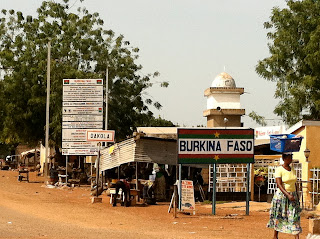Thursday morning we headed into Accra, partially because no trip to Ghana is complete without exploring the capital, but mostly to break up the barbaric bus trip back to Navrongo that loomed over us. With a week’s vacation already weighing on our wallets, we checked into another 8$/night hotel, this one complete with padlock on the front door and a knee-high hose spigot to shower. However, food was delicious and inexpensive, and the view from the porch was amazing, looking out over a bay full of fishing boats. After settling into our chicken-coop of a room, we hailed a cab to the Accra Mall, which is basically a little slice of New Jersey in the middle of Africa. Like hillbillies in WalMart for the first time, we admired simple wonders like movie popcorn and posed for group pictures in the middle of the grocery store. Intending to celebrate Lyubov’s 21st birthday that night, we picked up a cake and a “Happy 21st Birthday!” banner and headed over to Ryan’s Irish Pub, where we easily convinced the entire bar to sing for her.
 |
| Well worth $8. |
On Friday, we attended a barbecue at the American Embassy, a sprawling, intimidating fortress located in the Accra suburbs. The Marines who work at the Embassy host a barbecue every week for the families of Embassy workers, and we had received an invitation through some of the Peace Corps we met in Cape Coast. However, to get in, we had to hand over all electronics (sadly, including cameras) to the guards, walk through a metal detector, and be accompanied by a Marine at all times. I set off the metal detector no less than 3 times with not a clue how, and it was only at the firm insistence of TJ, our host, that the guards let me pass. We had a great time at the Embassy, enjoying our sloppy joes and AMERICAN FOOTBALL that the Marines magically get on tv, as well as being introduced to the ambassador as he picked up a hamburger. Besides the Marines, who were amazing hosts to us the entire weekend, we met a bunch of fascinating people who work at the Embassy, all of whom were really eager to help us out while in Accra. It seems like the American community in Accra is very close, and it was nice to be a part of it for the weekend.
Ceci’s dad went to boarding school in Accra, and so on Saturday we had lunch with her aunt and several of her dad’s school friends. Having gotten an American perspective of Accra the day before, it was really interesting to sit down with Ghanaians and hear their thoughts. I think we were all really intrigued by Dr. Alex, who has only recently moved back to Ghana after several decades in Ireland. He talked about Ghana’s capacity for development, saying that Ireland was still using outdoor latrines, too, in the 1970’s. However, he lamented the seeming lack of political and personal motivation to work on the infrastructure problems, like open sewers and poor roads, that have irked the four of us since we landed in Accra in August. Overall, my experiences in Ghana thus far have convinced me that I’m not meant to work internationally, which isn’t all that surprising to me, as I’ve been leaning towards working in the US increasingly over the last year. The more I see of Ghana, the more I’m convinced it needs civil engineers and garbagemen more than it needs doctors. Many Ghanaians apparently feel the same way, and Ghanaian health professionals in particular leave the country in droves every year. The brain drain is felt particularly strongly in areas like Navrongo, which are so cut off from the rest of the country that the geographical isolation alone is a deterrent for many young doctors.
We intended to leave Accra on Sunday, but the STC bus company wasn’t on the same page, forcing us to spend another day in the glittering wonderland that is the Accra Mall. Part of this was spent grocery shopping, stocking up on things we can’t get in Navrongo like peanut butter and vinegar (not intended for use together, though), but the majority was spent in anticipation of going to the movies that evening. The other International Health girls, who live just a two hours outside Accra, had come into the city to see us, and all of the IHealthies had agreed that we needed to see Contagion together before parting ways. In one of the dorkiest movie experiences of my life, the 7 of us sat in a row and marveled open-mouthed at the badassery of the World Health Organization and epidemiologists that could rival Jason Bourne. But it was awesome, and public health is really cool. Really.
 |
| ...and candy, too... |
Our lovely vacation came to a close on Monday, as we boarded another (albeit more comfortable) bus to Bolga. We made good time, actually, and joined a gaggle of old women in bartering further passage onto Navrongo. At midnight, we linked arms and walked home almost a mile in the dark, calmly skirting around packs of wild dogs and trying to convince ourselves that rabies can’t be that serious, anyway.







